Interview with Hiroshi Matsuyama, president of CyberConnect2, which is a game company that publishes original works and adapts them into dramas.

In February 2024, game company
·table of contents
◆“CyberConnect2 will not hire people” declaration and talk about recruitment and job changes
◆About the three Cyber Connect Two studios
◆About the drama version of “Chaser Game”
◆About “Copyright”
◆CyberConnect2 always starts with a planning proposal.
◆First publishing experience with original title “Battlefield Fugue”
◆Cyber Connect Two proposal
◆How to use words
◆“CyberConnect2 will not hire people” declaration and talk about recruitment and job changes
GIGAZINE (hereinafter referred to as G):
The other day, there was an opening party for the Osaka Studio, and I was invited to attend, and I heard Mr. Matsuyama declare in his greeting that ``Cyber Connect Two will not poach anyone.''
Cyber Connect Two Representative Director Hiroshi Matsuyama (hereinafter referred to as Matsuyama):
Yes, I said it.
G:
I was surprised that such a declaration was made in the greeting, but why did you make the declaration in the greeting?
Matsuyama:
So let's go from there. This is a rule that we have never broken in the 28 years since Cyber Connect Two was founded. ``We will not recruit people,'' ``We will not use agents,'' and ``We will not accept people who are currently employed at other companies saying, ``If I am selected to work with CyberConnect2, I will quit.'' If you have already retired, you can come, but I have heard that you must at least inform the company of your intention to resign and make it clear when you plan to retire, including the handover. not. I think CyberConnect2 is well known in the game industry for maintaining this stance all the time. People close to me often say, ``You can't hire someone like that, right?''
G:
Really?
Matsuyama:
Many people decide to decide what to do next before telling their company that they are quitting. But I hate it. I wrote an article expressing this on Note, but it got a little heated up.
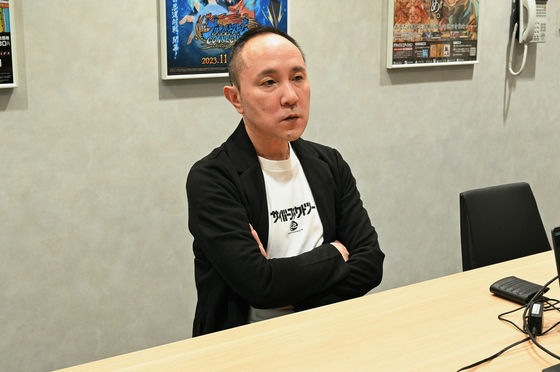
I won't kill you, so please don't kill me either | Hiroshi Matsuyama Cyber Connect Two
Matsuyama:
If you tell your current company that you're quitting even though you haven't decided on your next company and then start looking for a new job, you might end up with a period of no pay, so people who normally change jobs don't do this. .
G:
Yeah.
Matsuyama:
But I don't like it. When I join a company, everyone says ``Thank you very much,'' but when I quit, I say ``I'm resigning, and I've decided on my next job.My joining date is April, so I'll quit at the end of March.'' 'and. I thought, 'Well, why don't I talk to the company first?' Of course, there are many people like that, so I can understand why some people will be angry about my article. Some people said, ``It's like telling people who change jobs to die.'' However, this is just an expression of ``this is our policy''.
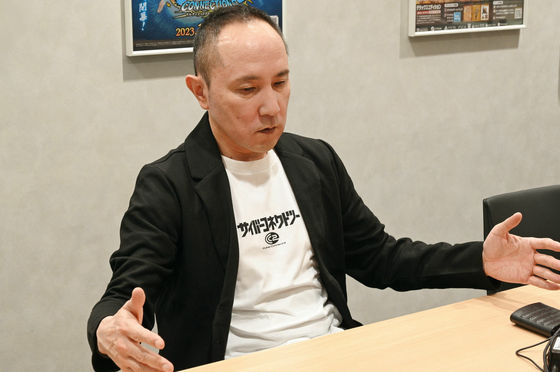
G:
I see.
Matsuyama:
So we set up a new studio in Osaka, and my vice president, Miyazaki, and I split up and went to greet some companies, told them the same story, and made the announcement at a party. One thing I was often told was, ``If Cyber Connect Two were built in Osaka, many employees would change jobs.'' Everyone was worried that people would be taken away.
G:
Ah, that's right.
Matsuyama:
However, it is the individual's freedom to retire, and it is our freedom to hire retired people, but at least we will not hire people who have not retired or who have not consulted the company about their intention to retire. . Instead, I'm asking you not to pull it out.
G:
Mr. Matsuyama said that you personally went to convey the information, but what was the reaction of the other party when you conveyed the information?
Matsuyama:
Many people say, ``We use agents to recruit, and we also hire people, so CyberConnect2 may be like that, but we can't imitate them.'' Of course, there are some places that say, ``We have similar policies,'' but there are only a few, including ours.
G:
Ahhh...
Matsuyama:
Our policy is to hire and train young people, but one company said, ``We don't hire new graduates, so we don't have the same skills as CyberConnect2, so maybe we can get along well.''
G:
(Laughs) It's been 12 years since I spoke to Mr. Matsuyama, and during that time I have seen and heard a lot of information that Mr. Matsuyama has sent out. I saw a story where a project that took two years became three years, and three years turned into four years. Is competition for human resources in the game industry becoming more intense than before as a result of this?
Matsuyama:
Yeah, it's pretty intense. If you carefully observe various aspects, you will notice that when game magazines or game sites publish interviews with developers or technical introductions of popular or famous titles, the same person from the team always responds to them. Sometimes it's just the first name, sometimes it's just the first name, sometimes it's just the initials.
G:
Ah, so that's what happens?
Matsuyama:
What I think is a bad situation in this area is that, for example, when a person is published in a magazine or speaks at
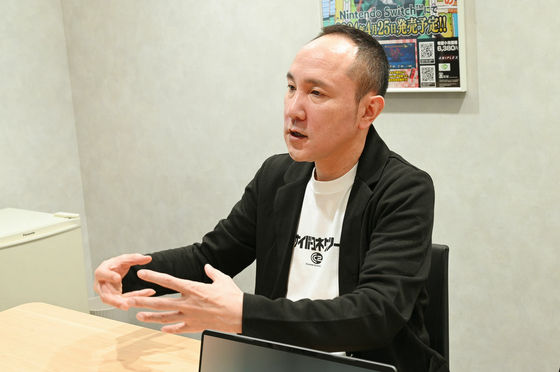
G:
I see, i see.
Matsuyama:
On the other hand, when a staff member decides to leave due to various reasons, I do not stop working at all.
G:
Aren't you going to hold me back?
Matsuyama:
If you work at a miraculous company called CyberConnect2, but you don't have the confidence to continue doing it any further, or if you want to try something else at another company, you might say, ``Okay, so the sooner the better.'' Masu. Being lazy is not the best thing. Of course, there are milestones in the project, so other executives and managers try to find the best possible compromise when negotiating, but I personally don't think that even that is necessary.
G:
Really.
Matsuyama:
I'm a creator who makes things, but first I'm a manager. I am the representative of the company. I think it's the same for all managers, but one of their absolute responsibilities is to pay everyone's salaries, even if it means risking their lives. We have to feed our staff and their families. While I am determined to pay my staff's salaries and put my life on the line, there are people who are thinking about quitting my company. ...If you think so, I want you to get off this ship right away. I would like to spend my life, time, and effort on people who want to continue working hard with Cyber Connect Two. That's why I've never held back.
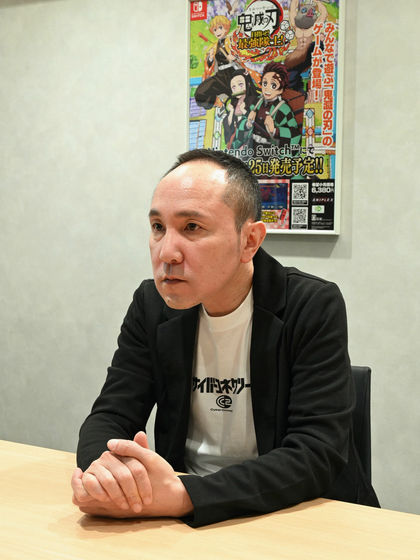
G:
I see…….
Matsuyama:
In the example of a job change, someone who changed jobs from company A to company B may invite you out for drinks. When I went there and asked them, ``What's going on?'', they said, ``Well, there seems to be a cultural difference between us and Company A...'' I'm the president of a game company, and I have some information about other companies, so I get asked a lot of questions like this.
G:
Do you consult with them and give them any specific advice?
Matsuyama:
There are two patterns. One pattern is that the person himself or herself has no choice but to change. After all, if you move from company A to company B and are told, ``Company B has a different culture than company A,'' all you can do is say ``That's true!'' (lol)
G:
Certainly (lol)
Matsuyama:
This is normal since it's a different company, but if you still think it's strange, say, 'Maybe you should change first?' The other pattern is, ``It's not a good fit in the first place, so quit.'' That means it's a waste of time. In Japan, I think that people who have changed jobs at many companies are seen as having a tendency to quit, thinking, ``Even if you come here, you'll quit anyway, right?'' If you change jobs, but the history is filled with people who quit after 3 months or 6 months, you might think, ``Wait, this person...''. However, it really depends on the relationship between people. It's case by case.
◆About the three Cyber Connect Two studios
G:
Each of the Cyber Connect Two studios has a concept keyword, and the Osaka studio's theme was ``En'' or ``Performance''. We will be launching a new video production team, hiring all the roles necessary for game development, including game designers, artists, programmers, and sound, and working with Fukuoka Studio and Tokyo Studio to create the work. …….
Matsuyama:
Actually, I stopped saying that (lol)
G:
Is that so.
Matsuyama:
Of course, that was my intention when I released the announcement video, but it seems that even the staff at the company got it wrong...
About the new Cyber Connect Two system - YouTube
Matsuyama:
Being a game company, it was natural for us to hire all the people needed to create games for all types of jobs, and on top of that, we wanted to hire people who could do so-called directing. Real-time production is CyberConnect2's forte, and it's something that I myself have been very particular about and have taught the staff about production theory. This means that we will be doing the same thing at our Osaka studio from now on.
G:
I see.
Matsuyama:
From now on, at this Osaka studio, where I will be stationed for the longest time, I will do everything from training new employees, and I will also teach them the ``Iroha'' of video production, but many people But he said, ``Apparently, Osaka Studio only makes videos.''
G:
Did it get received in a different direction?
Matsuyama:
I was asked about 100 times, ``Isn't this a video studio?'', so I said, ``I've stopped saying that!'' (lol)
G:
(lol)
Matsuyama:
I decided not to say it if I was going to be misunderstood, so I stopped saying it again. We are actively recruiting for all positions.
G:
The policy is the same as before, but it feels like it's an added advantage.
Matsuyama:
When I started leading CyberConnect2, I told the staff, ``From now on, I will become a developer who can sing and dance, and I will make everyone irreplaceable and special.'' For that purpose, what I will give you is ``the pride of doing a special job'' and ``money.'' I told him that I would make him richer than other people, so let's work together. Therefore, the Fukuoka head office is the 'soul'. It's the place where I started, and there are a lot of staff who have my mindset, and the total number of people is large, so I have an environment in place where the managers and seniors under me can properly pass the baton to the new staff. . I still make decisions about the big things, but I can now leave the small details to them and I feel like I'm becoming more independent.
Tokyo Studio is ``Ren''. Tokyo is a place where many companies such as publishers and television stations are gathered, so we communicate with many different people and feed that feedback back to Fukuoka and Osaka. It is a contact point for sharing information.
And our third studio, Osaka Studio, was opened. Of the three locations, I think Osaka is the most lively and attracts people who want to do and love interesting things. It may sound like an exaggeration, but I believe that there is definitely a lot of energy in the Kansai area, and I want to make this a studio where we can create things that we are particular about, including visual production. Masu.
However, to avoid any misunderstanding, we do not make different products in Fukuoka, Tokyo, and Osaka. We will make sure to work together at our three locations. It feels like the team members are spread out in their own studios. In terms of number of people, Fukuoka has the largest number of participants at over 200, followed by Tokyo at around 60 and Osaka plans to increase the number of participants in the future.
G:
Speaking of bases, you closed your Montreal studio after seven years.What was the reason for this?
Matsuyama:
The reason we closed our Montreal studio in July 2023 was to say, ``After seven years, we have completed our role, so let's close it.'' In the first place, we had a number of purposes for setting up our studio in Montreal, one of which was that Montreal was the most technologically advanced city in the world with the largest concentration of game creators.
G:
Indeed, I hear that Montreal has a large number of game companies.
Matsuyama:
Even within the past 10 years, we have achieved tremendous growth. There are about 25,000 game creators alone.
G:
Wow, it's an incredible town.
Matsuyama:
What happens when so many people gather together is a technological competition. Therefore, the annual income is of course higher than in Japan. However, we have top-class skills commensurate with that high base, so even before the coronavirus, people from Fukuoka and Tokyo would go to Montreal every month, study for a week or two, and then come back. Ta. Once a year, as long as my visa allowed, I would invite people from the Montreal studio to Fukuoka to learn their skills. By doing this for a certain period of time, I was able to acquire a sense of how to make things in an area that is particularly competitive overseas. Over the next seven years, I moved to Japan little by little.
G:
Is that even possible!?
Matsuyama:
There are actually people from Montreal who live in Japan and work at CyberConnect2. One of the reasons I closed the studio was because I had partially achieved my goals. However, there are also economic reasons. Intense competition also means that labor costs are rising. There are subsidies available, but the amount has gotten to the point where I thought, ``I don't think they will be available.'' It would have been nice if I could do the work that was worth it, but the weak yen hit me at this point.
G:
This cannot be done by a single company...
Matsuyama:
As expected, it was no longer worth the money, and we decided to close it, saying, ``It has served its necessary purpose and completed its role.''
G:
It was closed in July 2023, but the decision was made at an earlier stage.
Matsuyama:
During daily meetings of the board of directors, we decided that we should do this at this time. At that time, we decided, ``If we're going to close Montreal, we should open Osaka.''
G:
Did you choose Osaka as your next candidate out of several options? Or did you already decide that if you were going to do it, it would be in Osaka?
Matsuyama:
I had the idea that if I was going to open my next studio, it would be in Japan, in Osaka, and I was wondering when I should open it. The reason for choosing Osaka is that Cyber Connect Two employs 30 to 40 people a year, and about half of them are from Kansai. However, there was no studio in Osaka, so I had them come to Fukuoka or Tokyo.
G:
I see. Having a studio in Osaka would be an even more powerful option.
◆About the drama version of “Chaser Game”
Chaser game article list | Famitsu.com for the latest information on games and entertainment
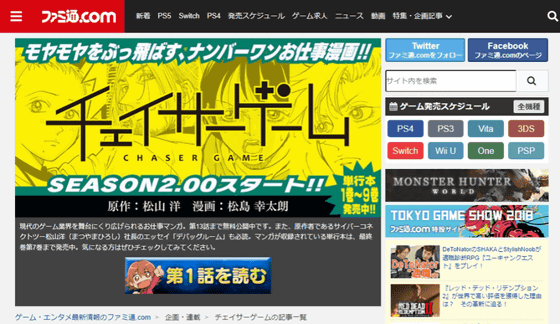
[Thu Dora 24] Chaser Game | TV Tokyo/BS TV Tokyo 7ch (official)
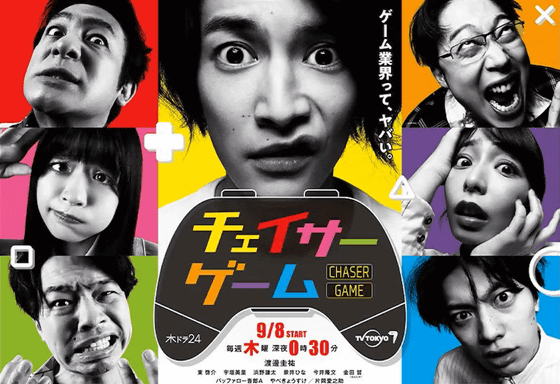
Chaser Game W Power harassment boss is my ex-girlfriend | TV Tokyo/BS TV Tokyo 7ch (official)
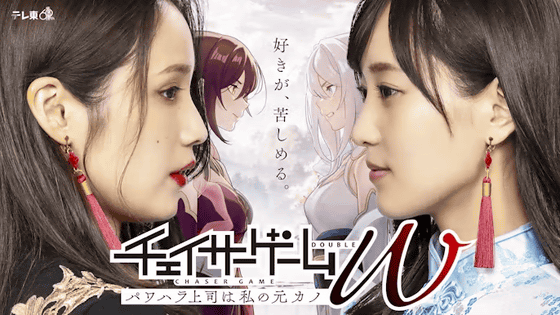
G:
Mr. Matsuyama is also in charge of the original work of the manga ``Chaser Game'', and the second drama ``Chaser Game W Power Harassment Boss is My Ex-Girlfriend'' was broadcast from January to February 2024. During the production of the first drama, it was decided to make the character Kimoto an unpleasant person, and the name was changed in the script, so I saw an episode in the book where Mr. Matsuyama changed it back... ….
Matsuyama:
I see. I think this is related to a hot topic, but my theory is that manga has manga customers, dramas have drama customers, and anime has anime customers. Of course, as a fan of the original work, the original work is my first priority, so I think I want the dramas and anime to be well directed and to push the switch in my heart in a good way. However, there is a drama style for dramas, and an anime style for anime. Particularly for dramas, the viewership is completely different depending on the broadcast time, so it's inevitable that people will say, ``I want to change this part of the original work to create a hook.''
In the case of ``Chaser Game,'' first of all, the company setting is that in the manga, Cyber Connect Two is a company called DD (Dynamic Dream), but there was a problem that everyone in the company was too nice.
G:
He's too nice (lol)
Matsuyama:
Even Ueda, who is the epitome of a character who can't do his job, is a bit charming, so I don't think there's anyone out there who doesn't like him. Then, a suggestion was made that it would be okay to have at least one unpleasant person in the company. The target was Kimoto, but the scriptwriters were more considerate and changed his name, thinking they were sorry because he was a real person. However, I said, ``It's okay if you don't make any changes; I'll let Kimoto know.''
G:
Since he's a real person, I can understand why the script took more care...
Matsuyama:
When I explained it to him, he said, ``If only one person doesn't like it, it means it's delicious, right?It's totally OK'' (lol)
G:
(lol)
Matsuyama:
Personally, I think this is within the scope of directing.
G:
When I was reading the note, it said that Mr. Matsuyama would have input into the script, and that he would also help out.
Matsuyama:
My involvement in the first drama, Chaser Game, and the second drama, Chaser Game W: My Power Harassing Boss is My Ex-Girlfriend, is slightly different. For the first film, I roughly said, ``I'll make decisions about the big things, but I'll leave things to a certain extent,'' and depending on the style of the drama, I left some discretion to the director and producer. . I'm not a drama professional, so even if I think about a script that comes to me and think, ``I talked about it at the meeting, I think it would be better to make this part a little more poignant,'' but I didn't get the impression it would have been in the editing after filming. I tried not to say anything because it might change.
However, it turned out that I was right in the part where I thought, ``Isn't it better this way?'', so I'm actively involved in the second work. We decided to create the same worldview but with an original script, and we used CyberConnect2 to actually create the props that were produced during the work. Of course, the screenplay is written by a screenwriter, but when it comes to things like, ``Wouldn't this line be better?'' or ``Wouldn't this flow be better?'', we have to include very specific details. We talked and moved on.
G:
There is a clear difference in how the first and second works are made.
Matsuyama:
Within the eight-episode structure, I worked very hard to determine where the first peak would be and what each story should accomplish.
G:
In the first drama, a transgender character named Rin Watanabe appeared before the manga. Apparently, when they were producing the drama, they wanted to include a transgender character, and they suggested that a character who was scheduled to appear in a new manga series appear in advance.
Matsuyama:
During the first production, the drama's production team said that they wanted to include a transgender character in this number of episodes to show that the company is a company where all kinds of people work. There are all kinds of people working in a company, but the game industry is a world where talent matters, so I wanted to create a space where race, gender, and age don't matter at all. 'Then we're planning to introduce a transgender character in Season 2 of the manga, so let's bring it in first.' Although the character is changing.
◆About “Copyright”
G:
Mr. Matsuyama has released more than 100 videos on YouTube called 'Piroshi Q&A' in which he answers the questions he receives. I saw that questions about 'copyright' came up several times.
Tell me about copyright! Piroshi Q&A #168 - YouTube
G:
I'm repeating myself, but why are games made with 'anime copyright' rather than 'original copyright'?
Matsuyama:
I think the easiest way to understand this is to imagine what would happen if we proceeded with everything based on the copyright of the original work. If you make a game using the original copyright, when the character model is created and you are asked to check it, who will be the one to check it?
G:
Either the manga artist himself or the editor has to check it...
Matsuyama:
The job of the manga artist who is the original author is to write interesting manga. When time is spent checking games and other things, it means that the time for writing manga, which is important, is cut away. When a worldwide blockbuster is created, an incredible number of products, including games, are produced, but it is impossible for manga artists or editors to check all of them. .
G:
surely.
Matsuyama:
If there is an anime, you can set up another window by using the copyright of the anime. Also, when producing an anime, a huge amount of setting materials are created. When you ask yourself, 'What's the setting like?', it also becomes the basis for having the game created in accordance with the setting materials. When a work is serialized over a long period of time, the art style may change, but in anime, the character settings are standardized to ``the face of the character that everyone knows'', so there is no blurring in the design. That's why anime copyrights are necessary as a system to control and license the quality of commercialization.
G:
Thank you for your easy-to-understand explanation.
Matsuyama:
The situation and the amount of money invested have changed from the past, and you have to aim for success with each work, so you can't just do what's good. People working in the industry, at least those in the character business, understand this before doing so. ...I want to believe that I'm doing it (lol)
G:
I think there are many people outside the industry who wonder, 'What is that Marcy?', so it was very helpful for me to have you talk about it in a more comprehensive manner.
◆CyberConnect2 always starts with a planning proposal.
G:
Something that Mr. Matsuyama has said in various lectures, and which also appears in Chaser Game, is that ``Since its establishment, Cyber Connect Two has only worked by making project proposals.'' there is. Why is this limited to work starting from planning proposals?
Matsuyama:
I will give you a very simple answer. We spend our lives creating things, but when someone asks us to do something, we can't decide for ourselves whether it's worth risking our lives for. That's why I'm proposing that I want to do this job.
G:
I see.
Matsuyama:
Currently, there are four works for which we hold the copyright: ``NARUTO'', ``JoJo's Bizarre Adventure'', ``Dragon Ball Z'', and ``Demon Slayer: Demon Slayer: Kimetsu no Yaiba'', as well as ``.hack'' and ``Fuga Senjo no Yaiba''. '', but whether it's something we've kept or an original, we propose it ourselves and say, ``Please let us pay for this.'' In a sense, this is a love call from us. When making a proposal, I am being presumptuous, but I also choose whether the IP is something we can grow together with. Therefore, for now, we have no intention of entrusting any IP other than these four.
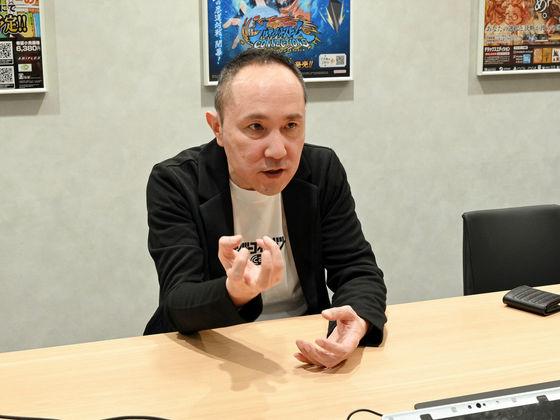
G:
There was such a clear reason. When choosing an IP, do you have any criteria other than whether or not you can grow together? Is it like when you look at a work and think, ``I want to do this!''?
Matsuyama:
All four IPs were serialized in Weekly Shonen Jump, and I've been reading Weekly Shonen Jump for 46 years since I was 6 years old, literally without missing a single book. When that happens, I begin to have a vague idea of what will be a hit in a serialized work...I might call it 'intuition' until then, but basically from the first episode... 'This is it!' Then, after reading the second and third chapters, I started to become more convinced. Weekly Shonen Jump has a serialization meeting based on the first three episodes, so I also make judgments based on the first three episodes.
◆First publishing experience with original title “Battlefield Fugue”
G:
``Battlefield Fugue'' is an original work by CyberConnect2, and it is also the first work for which the company became its own publisher. I often see your name on Steam, but what was it like actually working on it yourself?
Matsuyama:
When it comes to Steam, the golden rule of business is to display products in as many departments as possible, so it's only natural that we expand to all platforms. With ``Fuga of Battlefield,'' we were involved in the publishing business for the first time, and it was really difficult. Up until now, once we'd made something and delivered it, we'd just ask them to sell it to us, but this time we realized, ``Thank you so much, Bandai Namco and Aniplex!''
G:
That much (lol)
Matsuyama:
It was difficult before and after we launched the product, but ``creating'' and ``selling'' are two completely different things, and up until now we had only gotten halfway through our business. I've been making products for 20 years, but I'm involved in promotional activities such as selling and delivering them to customers, supporting inquiries from customers, and creating a ``swell'' in the title to make it exciting together with customers... I've helped publishers in the past, but up until now I've left it up to the publisher's strategy. The publisher also pays for the advertising costs, and when I saw the TV commercials and web ads, I thought, 'Thank you.' But when we tried it ourselves, we realized how difficult it is to keep doing it. I am working with Bandai Namco and Aniplex as partners, and I am truly grateful for the publishing, promotion, and sales including marketing. That's how difficult it was.
G:
On Steam, you can easily check the 'Developer' and 'Publisher' in the game information section, so I think it's easier to understand when the developer and publisher are different. In what order and in what way does this publisher perform the 'publishing' part?
Matsuyama:
I think this is partly because CyberConnect2 has always been a developer, but we created a game called ``Battlefield Fuga,'' and when it was completed, we came to the idea of ``all we had to do was sell it.'' So, ``It's completed,'' ``I've delivered the master,'' ``All I have to do is wait for the release date,'' and that's all I've done up until now, and ``Thank you for the rest.'' However, from this point on, we needed banners to display in the Steam, Nintendo Switch, and PlayStation stores. What's more, each platform has 5 types, all sizes are different, the notation rules are different, and the text on the store also has to be changed. In addition to Japanese, we also have to translate into other languages. It's true that if we don't do it ourselves, it won't be done automatically (lol)
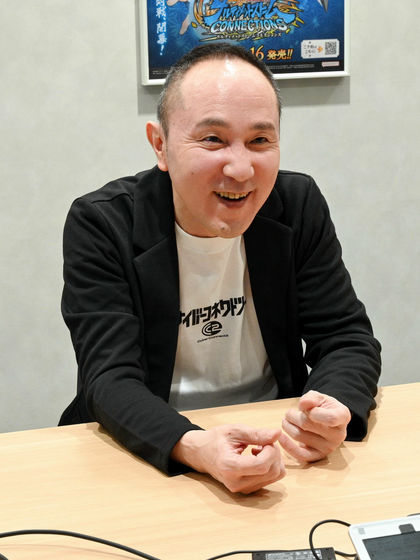
G:
You can only understand it by trying it.
Matsuyama:
It's obvious, but we haven't done anything like that until now, so we have to do the advertising and poster data submission ourselves. When presenting a title to the media, we have to make an appointment ourselves. Up until now, I've been contacted by Bandai Namco and Aniplex saying, ``I have a magazine interview on this day, so please put it in your schedule.'' I said, ``Okay,'' and then they set everything up for me. I just went there with my body and talked (lol)
G:
(lol)
Matsuyama:
But we have to start by saying, ``Hello, my name is Cyber Connect Two. I've created a game like this, and it's about to be released, so I'd like to ask for your cooperation in promoting it...'' Of course, you can't just make something and be done with it, but that doesn't mean that if you make something interesting and put it on the shelves, it will automatically sell. After delivering the product to the customer, we must take action to maintain the heat. For the past two to three years, we have been learning every day how to deliver products to customers ourselves. ``Fuga of the Battlefield'' had an initial sales of 10,000 copies...
G:
I think the sales had reached 100,000 units before the release of ``Fuga no Fuga 2'', but was that the initial sales?
Matsuyama:
It was released in July 2021 and sold 10,000 copies. Combined with 1 and 2, the series totaled 400,000 downloads.
G:
You piled it up.
Matsuyama:
My throat is dry from running every day (lol)
G:
(lol)
Matsuyama:
Every day, we check last week's numbers, update promotions and production, and check customer feedback, not just for ``Fuga.''
G:
Your history as a developer for over 20 years now overlaps with your history as a publisher.
Matsuyama:
We didn't realize until we tried that everything becomes our own blood and flesh. With ``Chaser Game,'' I had the experience of publishing a manga, selling it as a book, and making it into a film. I feel it's a great thing to be able to work together with TV stations and other people to make things exciting, and I think we'll continue to actively do interesting things that become our own blood and flesh. .
◆Cyber Connect Two proposal
G:
By the way, was the drama adaptation of 'Chaser Game' also a project proposal from Cyber Connect Two?
Matsuyama:
of course. We are a planning and proposal company, right? Since we were serializing Season 1 of the manga, it took about two years for it to take shape. Basically, I approached all kinds of TV stations, not only TV stations, but also animation and movies, so I made a lot of calls to various places to make it into the media, but in the end, I was rejected at the very beginning. It was chosen by TV Tokyo.
G:
Even though you were rejected the first time?
Matsuyama:
Even though it's a TV station, it's not like one person in charge makes all the decisions; there are various departments and channels within the station. So, it took two years for the person in charge who was different from the one who initially said 'no' to say, 'That's interesting.' I've often said this, but isn't proposing a project like sales? The basic principle of sales is that ``the real deal begins after you get rejected'' (lol). From the moment you get rejected, it's ``Yoidodon''.
G:
Does Mr. Matsuyama create the proposal for such cases?
Matsuyama:
Yes, I do have a brain. Of course, I made the plan for ``here and there,'' but I had them create a proposal based on that, and I went around with the sales staff with the completed proposal in hand.
G:
Is there a format or format that you always decide to include in such a proposal?
Matsuyama:
There's no format. Each piece is made one by one. For example, when creating a game proposal, the proposal for an IP work is completely different from the proposal for an original work, and it is also completely different for each IP. In the case of ``Chaser Game,'' there was an original manga, and the proposal was to turn it into a media film or live-action drama, so the people who looked at the proposal were the ones who decided whether to make it into a film or not. . The order, writing style, and content had to be in a way that those people would be interested in, so after my judgment, the staff at the site actually created it with their hands.
G:
I see, i see.
Matsuyama:
This is the same with other materials, even if you take a single CEDEC slide, I check all of them.
G:
Is it like doing an interim check once you've completed something halfway, and then doing a final check?
Matsuyama:
It depends on the situation, but there are cases where there are 10 interim checks, and there are cases where there are 20 times. On the other hand, there are some that only take 3 or 4 times.
G:
What is the difference between those 3-4 times and 20 times? Since there are so many things that need to be corrected, does this mean that it is a highly difficult task?
Matsuyama:
Is it because of the game planning that there are so many revisions? The reason is that there are many elements. The most effective order to explain things and the best way to present information differs from work to work, and there are many things that need to be explained. You won't know anything that isn't written in the proposal, so for example, if you make a proposal and someone asks, ``Doesn't this have an online element?'' and you answer, ``No, there is,'' that's no good, so don't write it in from the beginning. I have to. We will check and include any elements that the person making the proposal might be concerned about, such as whether there are any plans for DLC or what the update will be like. If it's an original project, there aren't any fans of the work yet, so we prepare character settings and worldview settings separately from the game plan, and each one is 20 pages long.
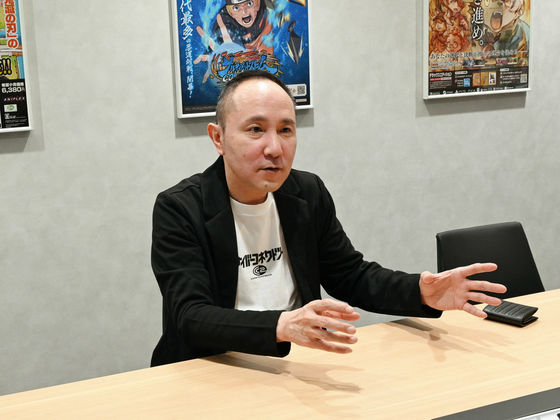
G:
It's pretty rough at that point.
Matsuyama:
We prepare things that represent the world of the work, just like setting materials for an anime, so that you can say, ``I see, I understand the game plan, and the characters...I see.'' By doing so, you can clearly communicate that ``this is a project that you want to compete in that direction.'' We had to propose something that was ``more than just a game,'' so that's how we proposed things like ``Battlefield Fugue'' and past works like ``Solatorobo and then to CODA.'' When someone says, ``It looks just like an anime,'' I say, ``That's right!'' That's exactly what I want them to say, so now I know how to sell them, so I'm going to have a meeting with them.
G:
I see, that's a clever way of doing business.
Matsuyama:
Planning proposals are part of sales, so it's a given.
G:
It's amazing how they do all the obvious things exactly.
Matsuyama:
In the case of ``Battlefield Fugue,'' I created the plan. This is a project where we need to train young people, and the concept is not to have 100 people, but to create something that can become a smash hit in three years, with a combination of veterans and young people, 10 or 20 people. did. If you don't do that, people won't grow. Nowadays, it takes six or eight years to develop a long project, and it takes about five years for a long project. Projects like that tend to turn around slowly, which slows down the growth of people.
G:
I see.
Matsuyama:
We held an internal competition with the idea of doing a project to accelerate this, but a lot of people said, ``That's not the case,'' and it didn't really click. The ones that came up from within the company were always projects like the IP titles we had worked on, which would cost billions of yen and take five years. I said, 'Did you hear what I said? You weren't.'
G:
It's not that kind of scale.
Matsuyama:
I understand, because that's the only kind of work I've made. Therefore, the production was short-term, and we decided on the key points, what we would do and what we wouldn't do, and we would develop something at about half the price, so we decided on one point: an RPG where you travel in a tank. It's a boy's manga where children live inside, and the story is about a terrifying weapon that will win 100% of the time, but if you use it, one child will be lost. If you don't set an example, you won't know how to fight. They already understand it now, but I feel like I'm still teaching them ``this is how to fight'' every day as I move forward.
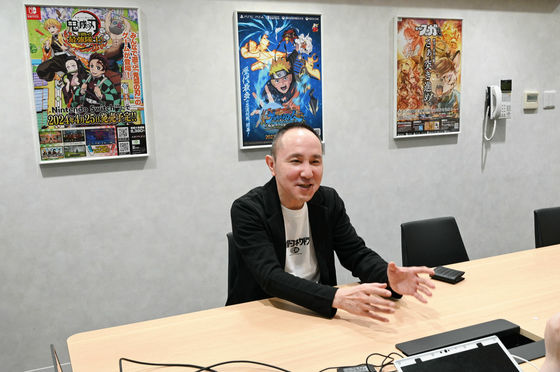
◆How to use words
G:
When I was reading the note, I noticed that Mr. Matsuyama was very particular about what words to use, and for example, he wrote ``involved in games'' instead of ``involved in games.'' Is there anything else that stipulates that ``this kind of word should be used here''?
Matsuyama:
Hmm...? I think there is, but I say it so much that it has become commonplace... (lol)
G:
Are you already trying to make everyone aware of this from the beginning?
Matsuyama:
I agree. The formatting rules are that the product name should be in double square brackets, and the words should be in square brackets. Some people write the product name literally without putting square brackets in it, but I hate that. After all, there are rules when communicating things through text, right? However, there are surprisingly many people who are indifferent.
G:
It was also written that if there were any typos or omissions in the resume, it would be deleted, but is that part of that?
Matsuyama:
People who make a lot of typos are people who can't work. The point is, don't write it yourself and don't do any revisions. Such people create bugs 100% of the time. Also, a resume is something that says, ``I want you to like me, so please take care of me,'' and it's like a proposal, so I can't marry someone who doesn't review it and is so dishonest. I can't send my precious daughter to marry in such a place. Even within our company, myself included, we are quite strict about typos, so we do internal debugging and always check with everyone before we release them into the world. Although we are all human, we are bound to make mistakes, but it is no good not to review them.
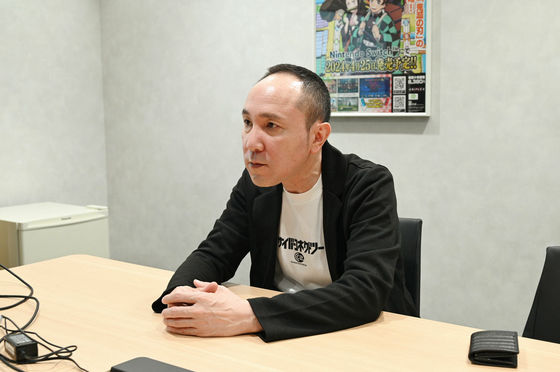
G:
Ah, I understand.
Matsuyama:
I don't know how many of GIGAZINE's readers are elementary school or junior high school students, but I want them to remember that no matter what kind of job they have in the future, the most important part of their current compulsory education is the Japanese language. think. There's not a day that goes by that I don't write. The best means of communication is words, writing. If you can't write, you can't read, so you can't understand. That's why it's really better to study Japanese properly.
G:
When I was at a cram school, I was told, ``Those who score low in Japanese will not be able to improve their scores in other areas because they cannot read the questions.'' (lol)
Matsuyama:
That's what I feel. You can learn a lot just by reading a lot of books. Even if it's just manga, I want them to read the text a lot.
G:
I see. It looks like we're running out of time. Thank you very much for your time today.
Matsuyama:
thank you very much.
◆Forum now open
A forum related to this article has been set up on the GIGAZINE official Discord server . Anyone can write freely, so please feel free to comment! If you do not have a Discord account, please create one by referring to the article explaining how to create an account!
• Discord | 'Tell us your favorite Cyber Connect Two game works!' | GIGAZINE
https://discord.com/channels/1037961069903216680/1219208335061155861
Related Posts:







